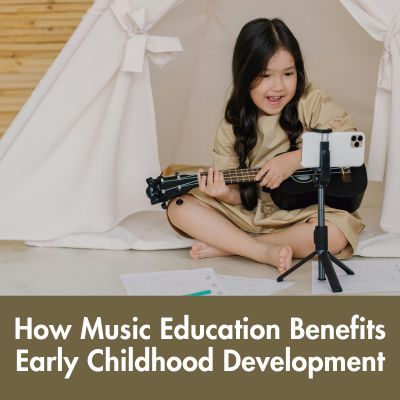The Joyful Sounds of Growth: How Music Education Benefits Early Childhood Development

Music education is more than just a fun activity for children; it’s a powerful tool that fosters early development and learning. As parents of toddlers or kids in daycare, understanding the profound impact that music can have on your child’s growth can help you make informed decisions about their early education.
Unlocking Potential with Music Education:
Why Music Matters in Early Childhood
Music education isn’t just about learning to sing or play an instrument. From infancy through preschool, music is a natural part of children’s lives and development. Engaging with music helps young children improve their motor skills, enhance their sensory perception, and develop auditory discrimination abilities. Early musical training can even accelerate brain development, particularly in areas involved in language acquisition and reading skills.
Cognitive Benefits: Tuning the Mind
Research has shown that children who receive music education often exhibit improved memory skills. This is because learning music involves recognizing patterns, which is a cognitive exercise. These skills are transferable to other academic areas, leading to better performance in school.
Emotional and Social Advancements through Music:
Music education in early childhood can also play a crucial role in emotional and social development. Participating in musical activities—whether singing in a group, clapping hands, or moving to a beat—provides children with important opportunities to interact with others, thereby enhancing their social abilities and emotional understanding.
Building Confidence and Creativity
Music allows children to express themselves in ways that words cannot. It provides a safe environment for young learners to explore their feelings and opens up new avenues for creative thinking and problem-solving. As they improve and see their own progress, their self-esteem grows. This aspect of music education is crucial because confident children are more likely to embrace challenges and excel academically.
Music and Language Skills: A Harmonious Relationship:
The relationship between music education and language development is particularly significant. Early music education stimulates parts of the brain associated with language and reasoning. The musical training teaches the brain to improve its natural sound recognition abilities, which are essential for learning to speak and read.
Enhanced Listening and Communication
Through music, children learn to improve their listening skills, which are vital for academic success and effective communication. Music activities that emphasize rhythm and melody strengthen the auditory cortex, the part of the brain responsible for processing sounds.
Long-Term Benefits of Early Music Education:
The impact of music education extends far beyond early childhood. Children engaged in music from a young age are generally more successful in academic and social spheres as they grow older. They learn discipline, how to manage performance anxiety, and the importance of persistent effort toward achieving long-term goals.
A Foundation for Lifelong Learning
Children who have been exposed to music education tend to have a broader understanding of cultural diversity and are more adept at social integration. These are important attributes that help individuals succeed in a globalized world.
How to Incorporate Music into Your Child’s Life:
Choosing the Right Program
When selecting a music program for your child, look for one that emphasizes creativity and enjoyment over rigid technique. Programs should offer a variety of activities, including singing, playing instruments, and movement, to keep sessions lively and engaging for young children.
Everyday Musical Activities
Incorporate music into everyday activities to make it a natural part of your child’s life. Sing songs together, play music during playtime, and encourage your child to make their own simple instruments like drums from household items.
Conclusion: Harmonizing Development with Music
The benefits of music education in early education are clear. It lays a strong foundation for children’s cognitive, emotional, and social development, equipping them with the skills they need for future success. For parents looking to give their children a joyful and enriching experience that promotes lifelong learning, music education offers a melodious pathway to achieving these goals. Remember, the goal is not to raise a professional musician, unless that becomes their passion, but to enrich their development and enjoyment of life through music.
If you’re looking for music lesson places in Oakville, Ontario, there are several reputable options available:
https://www.merriammusic.com/
https://www.kaosmusicoakville.com/
For further exploration of the topics covered in the blog about the benefits of music education in early childhood, you can refer to the following resource links:
Children’s Music Workshop
National Association for Music Education
Kinder Buddies Oakville Daycare is a Quality First Daycare and Infant Care facility in Oakville, Ontario. We take care of children from the age of 6 weeks to 5 1/2 providing nutritious meals and fun activities all day long.

 Previous Post
Previous Post